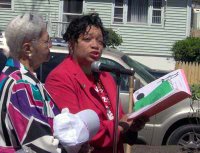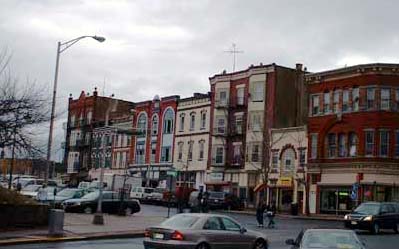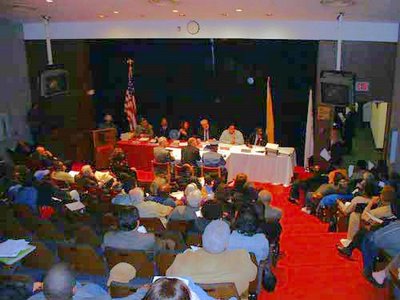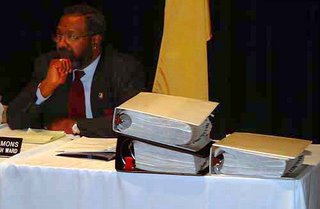Block Leader Honored On Arbor Day
 John W. Hayes was remembered as a tireless worker to improve the Rushmore Avenue neighborhood where he lived from 1963 until his death in 1991. His wife, Willie Hayes, received proclamations from Mayor Sharon Robinson-Briggs as part of a ceremony where a small triangular city-owned site was transformed into a green space for the enjoyment of the West End neighborhood.
John W. Hayes was remembered as a tireless worker to improve the Rushmore Avenue neighborhood where he lived from 1963 until his death in 1991. His wife, Willie Hayes, received proclamations from Mayor Sharon Robinson-Briggs as part of a ceremony where a small triangular city-owned site was transformed into a green space for the enjoyment of the West End neighborhood.Melvin Cody, the present president of the Rushmore Avenue Block Association, said Mr. Hayes was active with the group for over 35 years.
“Our main thing was making sure everyone had representation,” he said.
The block association now includes residents of West Third Street, Willever Street, Evona Avenue and Rushmore Avenue, he said. Concerns raised at block association meetings are carried to City Hall for resolution, he said.
“We have seen great improvements,” Cody said.
Councilman Don Davis said Hayes’ example should be passed on to the next generation.
“Plant the seeds now,” he said.
Symbolically, the torch was passed as children from Second Street Youth Center helped plant a Carolina Silverbell tree as a focal point of the park. “Stella D’Oro” daylilies, hosta, Japanese barberry bushes, viburnum and ornamental ivy rounded out the plantings.
The park was designed by landscape architect April Stefel, a member of the Ten Cities Tree Committee that has worked toward passage of a Shade Tree Commission ordinance. The ordinance was passed this year and will provide a means of protecting and perpetuating the tree stock that complements the city’s famed residential and historic neighborhoods.
 The site at Rushmore Avenue and Willever Street was crowded with neighborhood residents, public officials and well-wishers at the 11 a.m. ceremony.
The site at Rushmore Avenue and Willever Street was crowded with neighborhood residents, public officials and well-wishers at the 11 a.m. ceremony.According to a biography submitted by the city, Mr. Hayes was born on Feb. 29, 1920 and served in the U.S. Navy from 1939 to 1945. He worked at Lyons Hospital until his retirement and was a member of the Mohawk Lodge for many years. He was the first president of the Rushmore Avenue Block Association.
The Shade Tree Commission will soon be seeking members to carry on the work begun by the Ten Cities Tree Committee. Anyone with a love of trees or expertise in urban forestry is encouraged to submit a resume to the City Clerk‘s office at 515 Watchung Avenue.
(Disclaimer: This writer is a committee member.)
--Bernice Paglia








